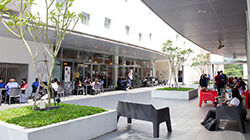Moving to University in a pandemic – Tanglin Trust School reports
Tanglin Trust report that for expat students at international schools, there is often a wide range of options to consider for university destinations. Our students have a broad world view, and many have family connections across cultures, which opens up choices about where to pursue further education.

Choices and challenges for international students
At Tanglin, my team of Careers and University Counsellors work with a worldwide network of university admission officers to guide families through the admissions processes across countries and institutions.Between us we have over 50 years of experience in education, working in both schools and universities in the UK, Europe, USA, Canada, China, the Middle East and Asia. Nevertheless, in the spring of 2020, we entered unknown territory with the arrival of the pandemic. Looking back now, it is remarkable how much determination and resilience the Class of 2020 showed in dealing with the ambiguity. Together, we worked through rapidly changing, pandemic-specific considerations to confirm the path of their journeys into higher education.
Higher education research
Firstly, higher education research has taken on a different perspective this year with colleges and universities marketing their institutions online via virtual fairs, tours, webinars, Zoom calls and recordings. Since March, our Careers and University Guidance team has participated in over 250 webinars, conferences and fairs. Zoom fatigue is, however, setting in with students. We advise them to think carefully about which fairs and information sessions to attend considering their schedules, but to register for others to receive recordings they can view later.
The university experience
Whilst universities endeavour to maintain safety and provide excellent tuition, they have come under increasing pressure to welcome students back to their campuses. Many families feel the cost of tuition should be reduced while they are studying online but, realistically, teacher contact time increases with asynchronized lessons and out-of-hours tutorials to cater for students in different time zones.Students who have already commenced their studies in Europe are now experiencing lockdowns and the uncertainty of whether they will be able to travel home in December. Many who are enrolled in the US and Canada are spending the first term working from home, saddened by the lack of social contact with their peers but hopeful to start on campuses in the spring.All of this is being watched carefully by our Sixth Form students. Will their university experience or gap year be similarly impacted, or will this all be over by graduation? Is it better to apply now while others take a gap year, or to gain work experience? These are constant themes in our meetings.Entry requirements
The 2021 A-Level exams may be pushed back into July, as the Irish Leaving Certificates were this year, but there are ramifications for university place confirmations in the summer. How long will universities be prepared to wait for results? Will that drive more A-Level students to take a gap year and apply with actual grades? We are hopeful our IB students will not face the same dilemma.The potential for a quick turnaround has been much discussed in recent years and has been proven to work in Scandinavia.There, students apply with their actual grades, normally within the month of July for domestic and EU students, then start in August or September.
Global destinations
The lack of travel options carries serious implications for international families. If students are quarantined at college in a different country what support networks will they have in place? How strong are the healthcare systems of the countries they are considering? And what is their confidence that the governments and institutions will safeguard students?Universities have developed Covid-19 pages to answer these questions, but the issues stretch beyond universities’ remits. Parents have to consider the travel restrictions of their residence as well as their child’s destination. With that in mind, online courses have become a safer option, and a way to keep loved ones together. Being based in Singapore, which has had relative success in controlling the virus to date, we have seen an increase in students staying here for degrees or turning to destinations deemed safer at the moment such as Australia and New Zealand. However, as a British-based school, we still expect to see between 60-70% of students apply to the UK in 2021. Familiarity and long-standing reputation has enduring appeal during times of uncertainty.Post-pandemic questions
As universities see the benefits of larger lectures moving online – will they go back to the traditional lecture format after the pandemic? Can the costs of higher education actually be reduced by a hybrid model of teaching, and could it be a better model? How competitive can universities be with scholarships in the future? Are we going to see greater migration of students or less?It will certainly take a few years for us to reflect on these changes and their impact on students. The additional complexity of choosing college lists in a pandemic is not something any of us have been trained for but is something we are quickly learning to deal with. What is apparent is the time we need to give students, to help them navigate all of this, is growing. Counsellors and universities are communicating more than they ever have and the networks of counsellors and admissions teams is vital as students weigh their options in this era of uncertainty.
Head of Careers and University Counselling at Tanglin Trust School, SingaporeFurther Information:Author BioZoë joined Tanglin in 2014 and has been a university counsellor for 13 years. She began her career as a History teacher in London and led a Humanities Faculty before becoming an IB Coordinator. Zoë holds qualifications from four UK universities and one US. She is on the service committee with International ACAC and the Global Advisory Board for St Andrews University. Zoë’s Careers and University Counselling team at Tanglin are active members of CIS, International ACAC, Singapore Counsellor’s Group and the British Chamber of Commerce. Tanglin University DestinationsOver the last three years, 95% – 99% of Tanglin students achieved their first or second choice university. In 2020 86% gainedtheir first choice, which includes the top universities worldwide, and 100% of students who wished to attend gained university places.Tanglin typically sees 10+ different international destinations applied to every year. Between 8-10% of Tanglin students complete National Service in Singapore before attending university. 99% of students matriculate to a degree, and UK universities usually receive 65% of Tanglin graduates.Tanglin Trust School
Established in 1925, Tanglin Trust School is the oldest British international school in South East Asia. Tanglin provides the English National Curriculum with an international perspective to children from 3 to 18 years in Singapore.As the only international school in Singapore to offer A Levels or the IB Diploma in Sixth Form, all of Tanglin’s Sixth Formers study a programme that is tailored both to the subjects they are passionate about and to the style of learning that most suits them, ensuring they thrive and flourish. More from Tanglin Trust School:
©2026 Re:locate magazine, published by Profile Locations, Spray Hill, Hastings Road, Lamberhurst, Kent TN3 8JB. All rights reserved. This publication (or any part thereof) may not be reproduced in any form without the prior written permission of Profile Locations. Profile Locations accepts no liability for the accuracy of the contents or any opinions expressed herein.






























